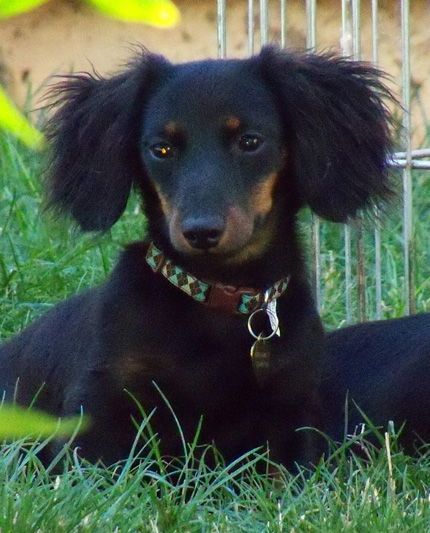Dachshund (medium coat) : : Male (not neutered, but will be before adoption) : : Baby : : Small
Learn more about the Dachshund.
| My Rescue |
| Login to Remember your Favorite Animals and Breeds! |
About DUSTY | |
|
|
This little guy has found a wonderful home with the son of his foster mom. Dusty has settled right in and with is making great inroads at becoming a well socialized little pup with the right help from his humans!
This 5 mos. old, 6 lb. little guy came in with a group of four, from a puppy mill - mom, dad, older brother and baby. He hasn't been socialized well with humans so will require a patient, gentle owner to help him in this process. He's a lively guy who loves to play with other doxies who are playful also. He would be best in a home with another young dog (preferrably a doxie) like himself to play with and show him that humans aren't all that bad. He IS a puppy and can be very energetic, so please consider this before you apply. Also, not being like most normal puppies, he isn't friendly to humans - he will run away unless you approach him in a squatting position very slowly. Please do as much research as possible on puppy mill dogs and their lack of socialization before applying for this baby. He will eventually come around, being so young, but it can take upwards of 6 months to a year and even then, may retain some of the abnormal behaviors.
Surprisingly, he has done really well on his housetraining, probably because he picks a safe spot in the house to hang out in, and doesn't wander around. As long as he's taken out on a regular basis, he will continue to do well with his housetraining. No kids under 14 please.
Puppy Mill Information
What is a puppy mill?
Puppy mills are basically puppy factories. They are in the business of producing litters of puppies to sell to pet stores and brokers for a huge profit. To make the most profit possible, the adult dogs (producers) are kept in very poor to horrendous living conditions, usually in cages or dog shacks which house many dogs together. The cheapest feed/corn is fed to most of them. Most of these dogs have never walked on grass, some have never been out of their cage. They have never had proper medical care or socialized with humans. They may have splayed feet and cement calluses, missing hair and teeth. They often come into rescue with infections, ear mites, sores and scabs on their bodies from flies, gnats, fleas, dogfights. Many of the females have been bred every six months from birth to about 6 years at which time they are no longer productive and no longer useful to the puppy miller. A nice puppy miller will turn the older females into rescue, many times they are simply shot.
For additional information*, check out www.puppymillrescue.com, www.stop-puppy-mills.com, www.nopuppymills.com.
Graphic pictures of a puppy mill* can be found at www.schsok.com./puppymillcase.htm and www.golden-retriever.com/mill.html, www.turner.com/planet/promotions/puppies/prisoners.html
What can you expect when you adopt a puppy mill dog?
Unconditional love and usually a gentle, quiet temperament. Normally, puppy mill dogs are not aggressive. At first, most puppy mill dogs are scared of humans and more shy than a normal socialized dog. They will probably always be a little more timid in new situations, but with training, socialization and patience, they develop self-confidence and are wonderful pets. They have never seen a toy, a tennis ball, a rawhide, a bone, a brush, a soft bed, stairs, ridden in a car, gone on a walk, swam in a lake. Many have never been petted, had their tummies rubbed and ears scratched.
The perfect family will have a fenced in yard, another dog and no children. These dogs cannot go to homes with an invisible fence as the trauma of being shocked could deter them from going outside at all. They did not have socialization with children as puppies and any mistreatment from children (ear-pulling, hitting, poking, etc.) will send a puppy mill dog scurrying to a corner of the room or under a table. Having another dog helps the puppy mill dog learn how to adjust to life outside the puppy mill. Puppy mill dogs tend to take their cues from the resident dog and simple things like drinking water out of a bowl, playing with a ball, learning where the appropriate bathroom areas are, walking on a leash, are all accomplished easier with the help of another dog in the family.
A family that adopts a puppy mill dog must be gentle and patient. Not housebroken, they learn quickly but cannot be handled with shouting or aversive training (no choke chains, prong collars, etc.). Positive motivational training and a gentle voice, lots of socialization and visiting new places to desensitize and get over fears of new noises and sights is very important. Puppy mill dogs tend to bond very strongly with their owners and having a puppy mill dog as a family member is extraordinarily rewarding.
More about DUSTY

Other Pictures of DUSTY (click to see larger version):





